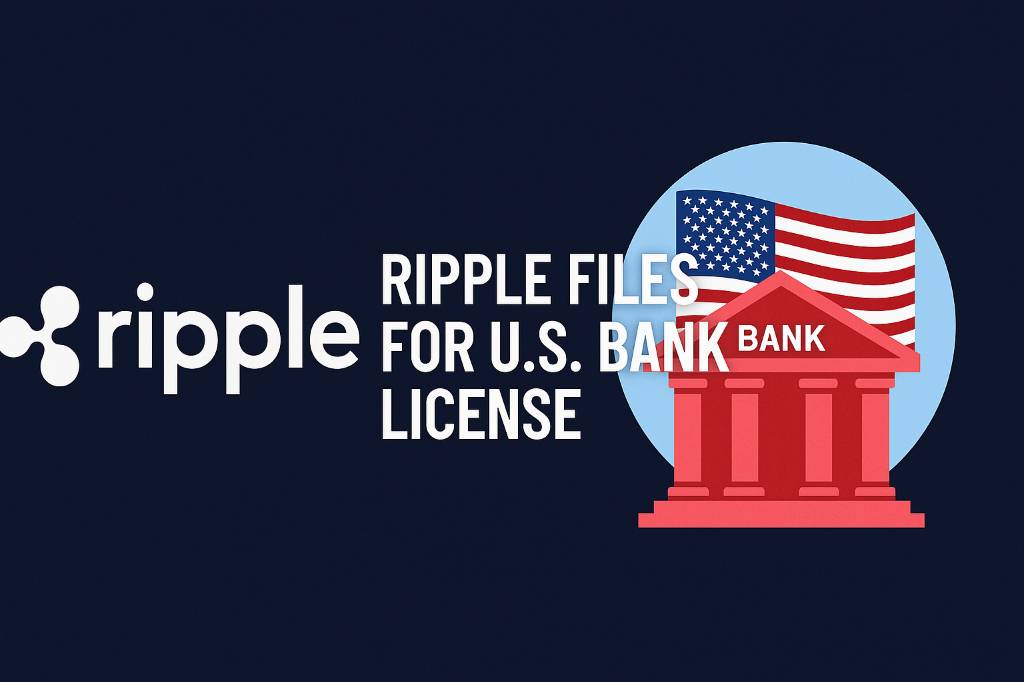
In a significant development that could reshape the future of blockchain-based financial services, Ripple Labs Inc., the fintech giant best known for its XRP cryptocurrency and enterprise blockchain solutions, has officially filed for a banking license in the United States. The move comes amid increasing clarity in U.S. crypto regulations and signals Ripple’s broader ambition to embed itself deeper into the global financial infrastructure.
- Ripple’s Banking Ambitions: What We Know So Far
- Why Is Ripple Seeking a U.S. Bank License?
- 1. Regulatory Clarity in the U.S.
- 2. Control Over Financial Infrastructure
- 3. Compete with Traditional and Crypto Banks
- Ripple’s Journey: From Startup to Potential Crypto Bank
- Implications for the Crypto Industry
- Regulatory Hurdles Ahead
- How Ripple Bank Could Function
- XRP Price and Market Reaction
- Global Strategy: Beyond U.S. Borders
- Industry Voices on Ripple’s Move
- Conclusion: A New Chapter for Ripple and Crypto Finance
- Stay Connected
This article explores Ripple’s banking license application, what it means for the U.S. financial system, its impact on the crypto ecosystem, and how it could transform Ripple into a full-fledged crypto bank.
Ripple’s Banking Ambitions: What We Know So Far
According to regulatory disclosures and multiple insider sources, Ripple filed its application with the Office of the Comptroller of the Currency (OCC) earlier this year. The application seeks a national banking charter, which, if approved, would allow Ripple to operate across all U.S. states without the need for individual state licenses.
Ripple has not publicly disclosed details of the application, but industry insiders say the firm is aiming to launch a digital asset friendly bank, offering services such as:
- Crypto custody
- Fiat to crypto on/off ramps
- Institutional grade lending and remittance services
- International settlement infrastructure using XRP Ledger
- Stablecoin based products (pending regulatory approval)
Why Is Ripple Seeking a U.S. Bank License?
Ripple’s move to acquire a national banking license aligns with its long-term vision to modernize global payments and remittances. With over 400 global financial institutions already connected to RippleNet, the company has evolved beyond its role as a blockchain protocol provider.
There are three main reasons behind this strategic pivot:
1. Regulatory Clarity in the U.S.
After years of legal uncertainty, Ripple recently secured a partial victory in its ongoing battle with the U.S. Securities and Exchange Commission (SEC), which alleged XRP was an unregistered security. A federal court ruled that XRP is not a security when sold on public exchanges, clearing a major hurdle for Ripple’s domestic operations.
The regulatory green light has emboldened Ripple to expand its services in the U.S., and a banking license will give it full access to the financial system under a unified federal framework.
2. Control Over Financial Infrastructure
By becoming a licensed bank, Ripple can:
- Eliminate dependence on third-party banking partners.
- Integrate crypto with fiat operations under a single regulated entity.
- Handle settlement and remittance flows directly using XRP.
This will allow Ripple to reduce operational friction and enhance trust among institutional clients.
3. Compete with Traditional and Crypto Banks
Ripple’s move positions it to compete with both traditional banks like JPMorgan and emerging crypto banks such as Anchorage, Revolut, and Kraken Bank. With its unique blockchain based infrastructure, Ripple could offer faster, cheaper, and globally integrated services that legacy players can’t match.
Ripple’s Journey: From Startup to Potential Crypto Bank
Founded in 2012, Ripple started with the ambitious goal of building the “Internet of Value” a world where money moves as easily as information. It launched RippleNet, a payment network powered by its consensus ledger and XRP token.
Key milestones in Ripple’s journey include:
- 2013–2017: Early adoption of RippleNet by banks and remittance services.
- 2018: Launch of xRapid, now part of RippleNet, using XRP for liquidity.
- 2020: Sued by the SEC for alleged unregistered securities sale.
- 2023: Legal victory confirmed XRP is not a security in most cases.
- 2024–2025: Expansion into CBDC (central bank digital currency) pilots with governments like Bhutan and Palau.
Now, Ripple is setting the stage for institutional level disruption by moving into regulated banking.
Implications for the Crypto Industry
Ripple’s banking license bid is a watershed moment for the entire crypto ecosystem.
Legitimization of Crypto Players
If approved, Ripple will become one of the first major blockchain companies to operate as a fully licensed U.S. bank. This will set a precedent for other crypto firms seeking to enter mainstream finance.
Bridging Traditional and Digital Finance
Ripple is uniquely positioned to bridge the gap between traditional financial institutions and decentralized finance (DeFi) networks. Its regulated bank can serve as a gateway for fiat to crypto interactions, bringing much-needed compliance and transparency.
Boost to XRP and RippleNet
With bank status, Ripple can offer seamless settlement solutions for cross-border payments using XRP as a bridge currency. This could revive institutional demand for XRP and strengthen RippleNet’s position as a global SWIFT alternative.
Regulatory Hurdles Ahead
Despite its progress, Ripple’s path to becoming a bank is not without challenges.
OCC and FDIC Scrutiny
The OCC (which charters national banks) and the FDIC (which provides deposit insurance) will scrutinize Ripple’s risk models, internal controls, KYC/AML compliance, and cybersecurity framework.
Crypto Skeptical Lawmakers
Some U.S. lawmakers remain wary of granting banking licenses to crypto firms due to past failures like FTX. Ripple must convince regulators of its long term solvency, transparency, and commitment to consumer protection.
Competition from Other Fintechs
Ripple is not alone. Other crypto native firms like Kraken (via Kraken Bank in Wyoming) and Anchorage Digital already hold charters. Traditional fintechs like PayPal and Square are also exploring bank like licenses.
How Ripple Bank Could Function
If licensed, Ripple’s bank could offer a full suite of services tailored to the crypto economy:
| Product/Service | Description |
|---|---|
| Custody Services | Institutional-grade storage of digital assets including XRP |
| Crypto-Fiat Exchange | Onboarding users into crypto securely with fiat on-ramps |
| Remittance Solutions | Real-time cross-border payments using RippleNet and XRP |
| Tokenized Assets | Stablecoin issuance, CBDC integration, and asset-backed tokens |
| Credit Products | Loans to businesses and individuals against crypto collateral |
This would mark the first time a crypto native entity controls both the payment network and banking infrastructure in one ecosystem.
XRP Price and Market Reaction
Following initial news of Ripple’s bank license filing, XRP saw a modest rally of 8%, reflecting investor optimism. Analysts believe the full approval of the license could drive XRP’s valuation up significantly, particularly if Ripple begins offering XRP based financial products under a regulated framework.
However, price volatility remains, as the application is still under review and could face delays or rejections.
Global Strategy: Beyond U.S. Borders
Ripple’s banking ambition isn’t just about the U.S.
The company is expanding globally, working with central banks and payment providers across Asia, the Middle East, and Latin America. A U.S. bank license would bolster its credibility in securing international licenses and partnerships.
Ripple also plans to create a multi jurisdictional financial network, linking regulated digital asset banks across countries a kind of decentralized SWIFT 2.0.
Industry Voices on Ripple’s Move
Brad Garlinghouse, CEO of Ripple, said in a recent interview:
“Our vision has always been to modernize the way money moves. Becoming a regulated bank is the next logical step in serving our institutional clients and expanding our impact globally.”
Sheila Warren, CEO of the Crypto Council for Innovation, commented:
“Ripple’s move to obtain a bank license is a sign that crypto and blockchain players are maturing and willing to play within the rules. It could be the dawn of a new era of compliance-driven crypto banking.”
Conclusion: A New Chapter for Ripple and Crypto Finance
Ripple’s decision to apply for a U.S. bank license represents more than a regulatory milestone it’s a strategic evolution into a full service financial powerhouse that merges traditional and digital finance. If approved, Ripple would not only expand its service offerings but also serve as a blueprint for the crypto industry’s future integration with the mainstream banking system.
As the OCC reviews Ripple’s application, the world watches closely. A successful outcome could signal that the age of blockchain based banks is no longer a futuristic concept it’s already here.
Stay Connected
For the latest updates on Ripple, XRP, and the evolution of digital banking, follow The News Drill across platforms:
📩 Contact us: contact@thenewsdrill.com
📢 Submit a tip or story: editor@thenewsdrill.com or visit our Contribute page.
















